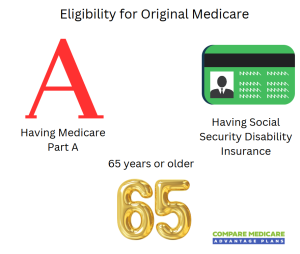Medicare Advantage Plans Vision Benefits
Confused about the potential Medicare Advantage plans vision benefits?
This guide cuts through the complexities, directly comparing some of the possible vision benefits from Medicare Advantage plans. Discover which options could suit your eye health needs, understand the costs that may be involved, and how to enroll.
Key Takeaways
- Poem of the Medicare Advantage Plans (Part C), administered by private insurers, may offer supplemental vision benefits that could go beyond Original Medicare, which may include routine exams, eyeglasses, and contact lenses; however, some of the benefit levels and costs may vary widely among plans.
- Regular vision care could be crucial for seniors due to age-related eye conditions such as cataracts and glaucoma, which could significantly affect the quality of life; some of the Medicare Advantage plans may include coverage for such conditions.
- Eligibility for a Medicare Advantage Plan with vision coverage requires meeting Original Medicare criteria; enrollment is possible during specific periods, and some plans may charge a monthly fee and have additional copayments and deductibles.
Compare Plans in One Step!
Enter Zip Code
Potential Medicare Advantage Plans and Vision Benefits

Some of the Medicare Advantage plans, also known as Part C, may offer a range of supplemental benefits, which could include vision coverage. These plans are administered by private insurance companies and will likely vary in terms of coverage, with some plans offering comprehensive benefits that could go beyond Original Medicare Parts A and B.
From the possibility of having routine vision exams to vision correction products, some plans may be designed to meet a variety of vision care needs.
Remember, the potential vision benefits may vary across different Medicare Advantage plans, so reviewing the details before deciding is crucial.
The possible coverage for vision care services may differ from plan to plan, including:
- Routine eye exams
- Eyeglasses
- Contact lenses
- Other vision care services
Make sure to carefully review the coverage that might be offered by each plan to ensure it can meet your specific vision care, hearing coverage, and prescription drug coverage needs.
Bear in mind, that while these plans may bring additional benefits, they might also entail extra costs. Some of these supplementary expenses could impact the overall monthly premium.
Therefore, conducting an in-depth evaluation of various Medicare Advantage plans for potential vision benefits is necessary to find your best fit.
Possible Features of Medicare Advantage Vision Coverage
One of the features in some of the Medicare Advantage vision coverage may be the potential inclusion of routine eye exams as part of their comprehensive Medicare coverage.
Some plans may cover routine vision exams, possibly making them a popular choice for seniors who may be seeking extensive vision care. Additionally, some plans may also include a stipend for eyewear.
Nonetheless, keep in mind that the level of coverage may not be uniform across all plans. There will likely be variability in the types of vision services that might be covered and the extent of coverage among plans. Furthermore, some plans may also impose a limit on the amount they could reimburse for eye care, the types of eyewear available, and the frequency of certain services.
In addition to routine eye care, some of the Medicare Advantage Vision plans may also provide coverage for diagnostic tests and treatments related to specific eye conditions such as cataracts and diabetic retinopathy, possibly making them a comprehensive option for seniors seeking Medicare cover vision benefits.
Comparing Medicare Advantage Plans for Vision Care
Several factors should be considered when comparing Medicare Advantage plans for vision care. Coverage, for instance, could vary across plans. While some plans may provide coverage for individuals with specific diagnosed medical conditions or those at high risk, others could offer coverage that may encompass:
- annual exams
- eyeglass frames with prescription lenses
- prescription contact lenses
- routine vision exams
Certain plans may even offer dental and vision care, possibly making them an attractive option for seniors seeking comprehensive healthcare coverage.
The provider network of the Medicare Advantage vision care plan could be another vital aspect to consider. Reviewing the plan’s provider directory on the plan’s website or reaching out to the plan directly for a directory may provide insights into the diversity and accessibility of network providers.
Moreover, getting a clear idea of the expenses that might be associated with vision care in certain Medicare Advantage plans is vital. Some plans may provide vision coverage at no extra expense, while others may require a monthly premium.
The Importance of Comprehensive Vision Care for Seniors

Due to the toll age-related eye conditions could take on a beneficiary’s overall health and quality of life, comprehensive vision care will likely be vital for seniors.
Seniors who are eligible for Medicare may enroll in Medicare Advantage plans that could offer vision care coverage, which will likely extend beyond routine eye exams to potentially include coverage for specific diagnosed medical conditions.
Some plans may be designed to meet the unique vision care needs of seniors, from preventive measures to diagnosis and treatment of age-related conditions.
However, the effective management of these conditions will likely necessitate seniors to be aware of the common age-related ocular conditions and their potential impact on quality of life.
Some of these conditions may include:
- Presbyopia
- Glaucoma
- Dry eyes
- Cataracts
- Diabetic retinopathy
These could significantly impact a senior’s ability to perform Activities of Daily Living (ADLs). Therefore, comprehensive vision care, including regular eye exams, could be instrumental in the early detection of these conditions, which may allow for more effective treatment and management.
Age-Related Eye Conditions
Age-related eye conditions will likely be common among seniors and could significantly impact vision and overall quality of life.
Some of these conditions may include:
- Cataracts, characterized by symptoms such as blurry vision and light sensitivity
- Glaucoma, which might lead to progressive vision impairment
- Macular degeneration, causing central vision loss
- Diabetic retinopathy, a primary contributor to vision loss in older adults
These conditions will likely be prevalent among older adults and could have a significant impact on their daily lives.
Routine eye exams may play a critical role in the early detection of these conditions when treatment can be most effective.
Seniors may also be advised to undergo a comprehensive eye examination with their ophthalmologist every one to two years once they reach the age of 65, to monitor and address age-related eye conditions.
Preventive Eye Care Measures

Along with regular eye exams, the possible incorporation of preventive eye care measures could be key to maintaining eye health in seniors. Another potential measure could be wearing sunglasses with UV protection, which may be able to safeguard the eyes from the harmful effects of ultraviolet rays and prevent various eye conditions.
Maintaining a healthy lifestyle is another preventive measure that might significantly impact eye health. A balanced diet and regular physical activity may also aid in maintaining a healthy weight, which is beneficial for eye health.
Consuming eye-healthy foods such as salmon, dark leafy greens, eggs, citrus fruits, and almonds, which are rich in nutrients like lutein, zeaxanthin, vitamin C, vitamin E, and zinc, could potentially enhance eye health.
Enrolling in a Medicare Advantage Plan with Vision Coverage
To enroll in a Medicare Advantage plan that may have vision coverage, individuals must meet the eligibility criteria for Original Medicare.
This includes:
 U.S. citizens aged 65 and older
U.S. citizens aged 65 and older
- Individuals receiving Social Security Disability Insurance (SSDI) for at least 24 consecutive months
- Those suffering from end-stage renal disease or in hospice care for Original Medicare Part A.
It’s also worth noting the enrollment periods for these plans. The Medicare Advantage Enrollment Period occurs annually from January 1 to March 31, providing individuals the opportunity to modify their Medicare Advantage plans if their current plan does not align with their requirements.
Additionally, the Medicare Open Enrollment Period, or the Annual Enrollment Period, takes place annually from October 15 to December 7, during which individuals can transition between Original Medicare and Medicare Advantage plans or make changes from one Medicare Advantage plan to another.
Eligibility Criteria
To be eligible for Medicare Advantage Vision Coverage, individuals must meet the age requirements of being 65 and older. Non-U.S. citizens who hold permanent residency in the United States and possess a green card may also be eligible for Medicare Advantage Vision Coverage.
Enrollment Periods
There are specific periods during which you can enroll in a Medicare Advantage Plan. The Initial Enrollment Period spans from January 1 to March 31. During this period, individuals can enroll in a Medicare Advantage Plan for the first time.
The Annual Open Enrollment Period, which is also called the Annual Enrollment Period, occurs every year from October 15 to December 7.
It is a set time frame for individuals to:
- Review and make changes to their health insurance coverage
- Transition between Original Medicare and Medicare Advantage plans
Further, individuals can enroll in a Medicare Advantage Plan outside of the standard enrollment periods under exceptional circumstances, with a 2-month window to join a Medicare Advantage Plan through a Medicare contract or a state Medicaid program.
To enroll, contact one of our licensed agents at 1-833-641-4938 (TTY 711), Mon-Fri 8 am-9 pm EST. They can provide comprehensive information, personalized guidance, and ongoing assistance to navigate the enrollment process for private insurance companies, making it easier for beneficiaries to make informed decisions about their healthcare.
Possible Costs with Medicare Advantage Vision Coverage

Even though some Medicare Advantage plans may provide extra vision benefits, they could entail associated costs that may include premiums, copayments, and deductibles.
In addition to premiums, copayments, and deductibles could be other out-of-pocket costs for services. Copayments are a predetermined fee paid for each visit or service that may be associated with vision care, while deductibles represent the annual out-of-pocket amount that must be satisfied before the plan offers coverage for vision care services.
Premiums
Premiums refer to the monthly fees that may be associated with certain Medicare Advantage plans that could offer vision coverage, which has to be paid in addition to the Medicare Part B premium.
Some of the premiums for certain Medicare Advantage vision plans could vary depending on the plan type, with some providing lower premiums but more restrictions. Additionally, some of these premiums may also differ based on the state or region.
Copayments and Deductibles
In certain Medicare Advantage Plans, there will likely be several types of cost-sharing for vision care services:
- Copayments: a predetermined fee paid for each visit or service
- Deductibles: the annual out-of-pocket amount that must be satisfied before the plan offers coverage
- Coinsurance: the plan might cover a portion of vision care expenses while the individual pays the remainder
Alternatives to Medicare Advantage Vision Coverage

While some Medicare Advantage plans might extend comprehensive vision benefits, those who may be seeking different options may also have alternatives available. Certain standalone vision insurance plans and discount programs may be two such alternatives to Medicare Advantage vision coverage.
Standalone vision insurance plans will likely be individual coverage options that could be designed to assist with the cost of eye exams, contacts, glasses, and other vision-related expenses.
On the other hand, discount programs may offer a range of services at reduced costs, which could provide another viable alternative for seniors seeking vision care.
Standalone Vision Insurance Plans
Standalone vision insurance plans may be individual coverage options that could aid in covering expenses related to eye exams, contacts, glasses, and other vision-related services. They function by potentially offering defined costs for vision care, that may come with a fixed copay for an examination.
The specifics of plan design and availability may differ based on the state, and some standalone vision plans may allow individuals to combine vision coverage with a dental plan.
The potential inclusions in certain standalone vision insurance plans may be coverage for routine eye exams, glasses, and contact lenses.
Discount Programs and Other Resources
Seniors could have access to a range of discount programs for vision care, which may include AARP discounts, veteran discounts, and programs that may be offered by organizations like EyeCare America and Eyemed.
Some of these programs could offer a range of services that may come at reduced costs, possibly making them a viable alternative for seniors seeking vision care.
Another resource that could help reduce the cost of vision care for seniors is optometry schools, which could offer complimentary or low-cost eye exams and eyeglasses.
Furthermore, seniors in need of vision care may be able to access financial assistance from a range of organizations and services, which may include:
- Medicaid and CHIP programs
- Funding from the Lions Club for essential surgeries
- National Grants for Vision Care
- EyeCare America – The Seniors Program is specifically tailored for seniors.
Summary
Vision care will likely be a crucial aspect of overall health, especially for seniors. Some of the Medicare Advantage plans may offer comprehensive vision benefits, which could extend beyond the coverage of Original Medicare. Some of these plans, administered by private insurance companies, may include routine eye exams, eyeglasses, contact lenses, and coverage for specific eye-related medical conditions.
However, the potential coverage and costs may vary from plan to plan, making it essential to compare different plans to find the one that best suits your needs.
Potential alternatives to Medicare Advantage vision coverage, such as standalone vision insurance plans and discount programs, may also exist and could potentially provide various levels of coverage for eye care. Regardless of the option chosen, regular eye exams and preventive measures may be vital for the early detection and management of age-related eye conditions.
Frequently Asked Questions
→ What Medicare Advantage plan has the best vision coverage?
The best Medicare Advantage plan for vision coverage will likely be the one that could offer you the comprehensive vision care options that you need. Consider comparing plans to find the best coverage for your needs.
→ Do Medicare Advantage plans cover eyeglasses?
Yes, some Medicare Advantage plans may cover eyeglasses and routine eye exams, but the coverage options and potential costs may vary depending on the specific plan and location.
It’s important to check your plan’s details to understand the extent of the coverage.
→ What are the additional benefits of certain Medicare Advantage plans?
Some of the Medicare Advantage plans may offer additional benefits like vision coverage, which may include routine exams and vision correction products.
This could potentially enhance the advantages of Original Medicare by possibly providing extra vision care services, making it a comprehensive option.
→ What are common age-related eye conditions?
As you age, common age-related eye conditions to be aware of will likely include cataracts, glaucoma, macular degeneration, and diabetic retinopathy. Be sure to have regular eye exams to catch any issues early.
→ What are the eligibility criteria for Medicare Advantage plans with vision coverage?
To be eligible for Medicare Advantage plans with vision coverage, individuals must meet the eligibility criteria for Original Medicare, which includes U.S. citizens aged 65 and older, individuals receiving SSDI for at least 24 consecutive months, or those suffering from end-stage renal disease or in hospice care.

ZRN Health & Financial Services, LLC, a Texas limited liability company
Russell Noga is the CEO of ZRN Health & Financial Services, and head content editor of several Medicare insurance online publications. He has over 15 years of experience as a licensed Medicare insurance broker helping Medicare beneficiaries learn about Medicare, Medicare Advantage Plans, Medigap insurance, and Medicare Part D prescription drug plans.



 U.S. citizens aged 65 and older
U.S. citizens aged 65 and older